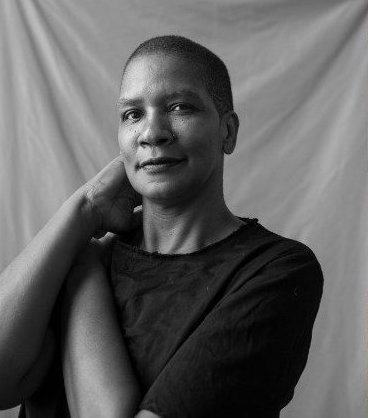Introduction to Take ’Em Down: Scattered Monuments and Queer Forgetting | Pamela Sneed
May 18, 2022
Publication Studios, 2022
Reading Simon(e) Van Saarloos’s Take ’Em Down: Scattered Monuments and Queer Forgetting, my first thought was a recent conversation I had with a class full of writing students at a university where I teach. The conversation was regarding the personal essay. I asked the class what they were learning about writing in the course. I thought they’d comment on the material, bell hooks’s Outlaw Culture or my own Funeral Diva, a hybrid work about coming of age in the first wave of the AIDS era. Instead, a Black student said something that surprised me, “In your class, I’ve had to unlearn everything I’ve ever learned about writing.” The other students echoed and supported this student's comments. Of course, my intent as an artist and educator is to fundamentally change the way students think about and view the world and themselves, to aid them in becoming abolitionists, critical thinkers, engaged citizens, survivors.
I imagine—and it is a reality—that we human beings are in a war, fighting many constant wars all over the globe. It is my belief and hope that artists can save humanity, create new pathways when all is lost. I was surprised at my students' comments because I’d momentarily lost touch with how difficult it might be to make a fundamental shift, to stand against all they, we/I have ingested. I thought about this because to me that is one of the many things Take ’Em Down asks us to do—to fundamentally shape new ways of thinking, to forget, reconfigure, unlearn the ways we’ve been taught to commemorate and memorialize.
Pamela Sneed | image: Lia Clay
Of the many things that stand out, I was drawn to a quote by Hannah Arendt, in that only spontaneous acts can create something new. I have trained extensively as a writer and poet, also a performer, a theatre artist, a director and a singer. In the past six years I have trained as a visual artist learning painting, drawing, and collage. At the outset of each of these disciplines the teacher is assigned with jogging the adult artist's ingrained ideas, the way perhaps we unconsciously memorize a pattern or a route, and there is no possibility for spontaneity or vitality—with everything decided, the art can’t breathe or move. So a director may ask the actor to say a monologue while jumping up and down or running around the room to interrupt any decided patterns. The poetry teacher may ask students to not try to make sense, to play with image and language, to read a poem backwards and side to side, so that the text can be experienced anew, so that there is room for spontaneity. A visual teacher asks us to do an exercise, to close our eyes, and to do a blind contour drawing of an object. The irony of this is that we close our eyes to learn to see. There is also the irony in visual art that more truth and more reality is often found in abstraction.
So many issues in Take ’Em Down resonate with me, things that I still for all my writing haven’t written about: Being a queer Black woman in the American medical system, seeking treatment for fibroids and subsequent issues and trying to avoid a radical hysterectomy, within a system that thrives on sterilizing Women of Color—particularly poor and working-class women—when there are other options, a system that refused to allow me to participate in issues regarding my own body, where I was constantly gaslighted. I realized then and now there are ways you can be locked up without ever being locked up.
As an aside, I had dinner with some Queer and Trans folks last night celebrating a friend's birthday party. A Black Trans man talks to me about their recent experience of bringing formerly incarcerated POC to Ghana to visit the former slave fort Cape Coast Castle. He spoke about how profound it was for each of them to walk through the door of no return and seeing the dungeons and architecture caused the leader to say out loud, “This is just like Attica.” “You must write that down,” I say.
My personal experience with the medical system in America opened my eyes, relearning how one could fall through the cracks in broad daylight in front of their peers. I also lived through the early 90s AIDS crisis as a caretaker and saw my peers decimated. I’ve witnessed women poets like Audre Lorde, June Jordan and other leaders ravaged and felled by cancer. I’m well versed in the travesties of the system. My recent experiences led me to proclaim in the poem from Funeral Diva, “A Tale of Two Pandemics,” about Covid-19 and the AIDS era, “I want this to be a time of a medical me too, where survivors step from the shadows and speak, name the atrocities committed.”
Simon(e) van Saarloos | image: Isabel Janssen
Van Saarloos’ work reminds me I’ve been thinking a lot about capitalism. It’s trickled like South Africa’s former apartheid into everything. It’s a toxin that’s poisoned our air. It’s like breathing asbestos. It’s like the gaseous fumes of Chernobyl. Everything is afflicted by it. It's like a monument erected in Central Park to tribute a war criminal like J. Marion Sims who performed gynecological experiments and surgeries on Enslaved Black women without anesthesia. Though I abhor the use of black and white imagery, capitalism is like the brown tap water found in Flint Michigan filled with lead. I once wrote in an unpublished work, “America Ain’t Ready,” capitalism with its competitive nature has turned us into a nation of scavengers, bullies and thieves. Recently talking to a friend we discussed how capitalism and technology have led to the era of the scam. Television shows about catfishing and all types of fraud abound. The internet and social media are rife with people not being who they pretend to be. Identity theft is also a common practice—not just in terms of online scamming—and is indicative of a nation of lost souls, not knowing who they are.
Returning to the notion of unlearning old paradigms and reimagining monuments and acts of commemoration, it’s important to say my grandfather was a Baptist minister. My knowledge of poetry and theater comes from him, from the Black preachers, from their creativity with language. Through feminism, Queer and POC movements, I left behind the religiosity of my grandfather's teachings. I still like some of the stories, how they can be parables about life. I listen to people like Reverend Michael Beckwith. To build more self-awareness, I often ask students to contemplate his fundamental question, “What's running you?” Is it fear? Is it joy? Like the beginning of Take ’Em Down, Dr. Beckwith also contemplates lack, limitation and scarcity mentality bred by capitalism, by systems intent on keeping people small, that don’t want us awakened.
Take ’Em Down reads to me as a call to expand our consciousness, to act. Though it is a blend of philosophy, Queer and Feminist theory and Disability Justice, it reminds me of my favorite parts of liberation theology—it is language and action that ultimately frees us.
Pamela Sneed is an American poet, performance artist, actress, activist, and teacher. Her book Funeral Diva (City Lights, 2020) is a memoir in poetry and prose about growing up during the AIDS crisis and the winner of the 2021 Lambda Literary Award for Lesbian Poetry. Her other books include Sweet Dreams (Belladonna, 2018), Kong and Other Stories (Vintage Entity Press, 2009), and Imagine Being More Afraid of Freedom than Slavery (Henry Holt, 1998).
Simon(e) Van Saarloos is a writer, philosopher, and performer based in Amsterdam, the Netherlands. They have published several books in Dutch, and two in English translation with Publication Studios: Playing Monogamy (2019) and Take ’Em Down: Scattered Monuments and Queer Forgetting (2022).



